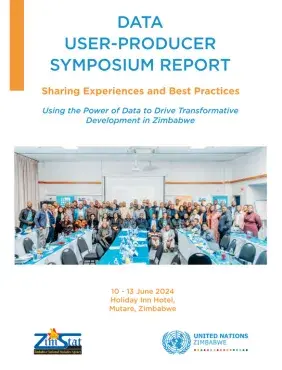This report highlights key submissions and recommendations made during a symposium that brought together producers and users of data. The Zimbabwe National Statistics Agency (ZIMSTAT) and the United Nations, operating under the Data for Development and Innovation (DFDI) Technical Working Group (DFDI–TWG) jointly hosted the four –day symposium in Mutare from 10 to 13 June 2024.
The primary goal of the symposium was to bring together stakeholders to facilitate dialogue and knowledge sharing on how best to produce and use data in Zimbabwe to effectively address Zimbabwe’s development priorities, as captured in the first National Development Strategy (NDS1) and its contribution towards achieving the Sustainable Development Goals (SDGs).
Symposium proceedings were in the form of keynote presentations, presentations by experts, panel discussions, plenary sessions, breakout sessions, group discussions and networking opportunities to improve participants’ understanding of the data production process, initiate communication among data producers and users, come up with ways to improve the country’s data ecosystem and explore the role of data in sustainable development. Participants – drawn from Government ministries, departments, and agencies, development partners, civil society organizations, academia and the private sector – acquired a comprehensive overview of the Zimbabwean data ecosystem through shared experiences and best practices.
By the end of the workshop, participants demonstrated enhanced understanding of how issues such as – limited resources; data collection discrepancies; and inadequate human skills – affect data production and usage and the impact on national development. The DFDI group was restructured, DFDI clusters developed Joint Work Plans and available data on SDGs was reviewed.
Key recommendations included: collaboration between DFDI and ZIMSTAT should continue; budgets be drawn up to fund DFDI clusters Joint Work Plans; ZIMSTAT to share Data Quality Framework and Data Validation Procedures among producers and users; establishment of a central data repository and training and information sharing on effective data collection, analysis and utilisation should be ongoing. Recommendations for more funding for data production, legislative amendments, and investment in information and communication technology were also made to address the challenges within Zimbabwe’s data ecosystem.
The impact of limited human and technological resources and organisational operating systems on data production was highlighted. Concern over data gaps particularly gender disaggregated data and the exclusion of data gathered outside of official data collection parameters was raised. Overall, the symposium made extensive information and knowledge sharing on data production and usage among stakeholders possible.


